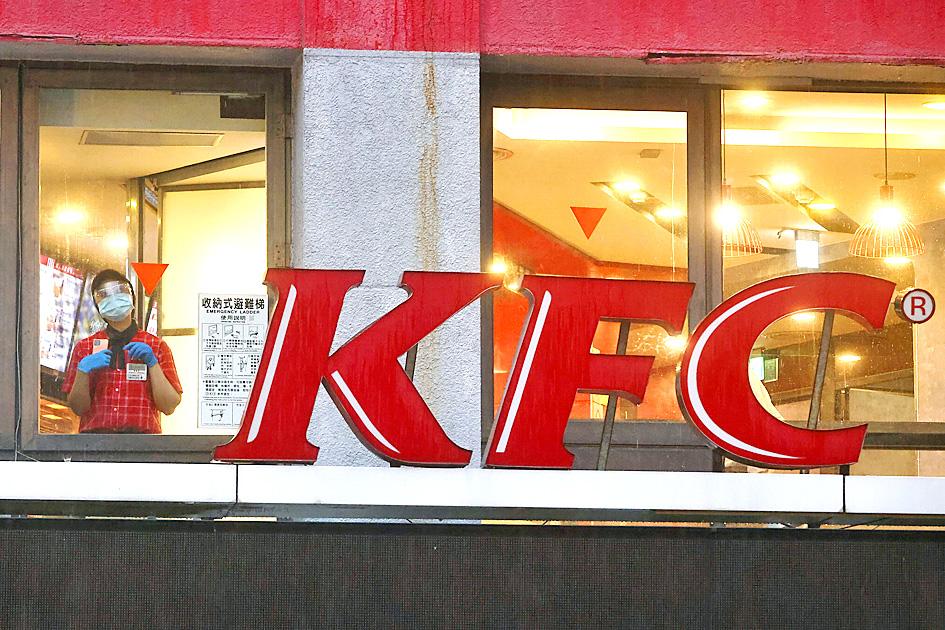Jardine Matheson Holdings Ltd (怡和洋行), a diversified Asia-based group whose businesses span property, transport, retail and luxury hotels, is considering strategic options for its restaurant unit, people with knowledge of the matter said.
The Singapore-traded conglomerate is weighing a sale of Jardine Restaurant Group (怡和餐飲集團), a wholly owned subsidiary that operates KFC and Pizza Hut franchises in Taiwan, Hong Kong, Macau and Vietnam, said the people, who asked not to be identified as the information is private.
The subsidiary also runs Pizza Hut restaurants in Myanmar, according to its Web site.

Photo: Ann Wang, Reuters
Jardine Matheson has held preliminary discussions with advisers, the people said, adding that deliberations are still at an early stage and the group could decide to keep the business.
A representative for Jardine Matheson did not immediately respond to requests for comment.
Yum! Brands Inc, the owner of the KFC and Pizza Hut trademarks, sold the KFC business in Taiwan in 2010 and offloaded the KFC franchises in Hong Kong and Macau to Jardine Restaurant Group in 2013, the unit’s Web site said.
Jardine Restaurant Group operates more than 900 restaurants in the region and has more than 27,000 employees, the Web site shows.
The unit contributed US$18 million profit to Jardine Group in the six months ended in June last year, compared with US$15 million in 2020, Jardine Matheson’s half-yearly earnings announcement showed.

Nissan Motor Co has agreed to sell its global headquarters in Yokohama for ¥97 billion (US$630 million) to a group sponsored by Taiwanese autoparts maker Minth Group (敏實集團), as the struggling automaker seeks to shore up its financial position. The acquisition is led by a special purchase company managed by KJR Management Ltd, a Japanese real-estate unit of private equity giant KKR & Co, people familiar with the matter said. KJR said it would act as asset manager together with Mizuho Real Estate Management Co. Nissan is undergoing a broad cost-cutting campaign by eliminating jobs and shuttering plants as it grapples

TEMPORARY TRUCE: China has made concessions to ease rare earth trade controls, among others, while Washington holds fire on a 100% tariff on all Chinese goods China is effectively suspending implementation of additional export controls on rare earth metals and terminating investigations targeting US companies in the semiconductor supply chain, the White House announced. The White House on Saturday issued a fact sheet outlining some details of the trade pact agreed to earlier in the week by US President Donald Trump and Chinese President Xi Jinping (習近平) that aimed to ease tensions between the world’s two largest economies. Under the deal, China is to issue general licenses valid for exports of rare earths, gallium, germanium, antimony and graphite “for the benefit of US end users and their suppliers

Dutch chipmaker Nexperia BV’s China unit yesterday said that it had established sufficient inventories of finished goods and works-in-progress, and that its supply chain remained secure and stable after its parent halted wafer supplies. The Dutch company suspended supplies of wafers to its Chinese assembly plant a week ago, calling it “a direct consequence of the local management’s recent failure to comply with the agreed contractual payment terms,” Reuters reported on Friday last week. Its China unit called Nexperia’s suspension “unilateral” and “extremely irresponsible,” adding that the Dutch parent’s claim about contractual payment was “misleading and highly deceptive,” according to a statement

The Chinese government has issued guidance requiring new data center projects that have received any state funds to only use domestically made artificial intelligence (AI) chips, two sources familiar with the matter told Reuters. In recent weeks, Chinese regulatory authorities have ordered such data centers that are less than 30 percent complete to remove all installed foreign chips, or cancel plans to purchase them, while projects in a more advanced stage would be decided on a case-by-case basis, the sources said. The move could represent one of China’s most aggressive steps yet to eliminate foreign technology from its critical infrastructure amid a